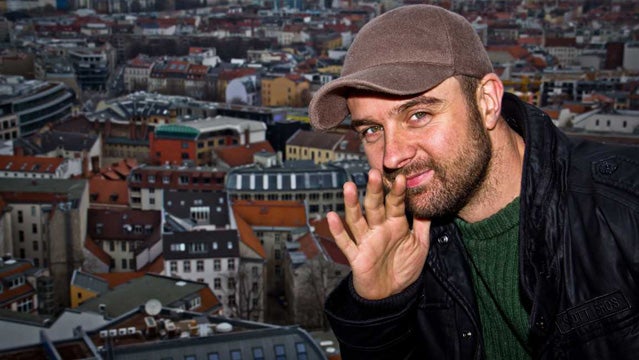Michael Wigge travels light, and not just with his luggage, but also his wallet. The 36-year-old German video journalist, author, and comedian spent 150 days in 2010 traveling through 11 countries, from Germany to the United States and all the way down to Antarctica, starting . He changed the oil of cargo ship engines for rides across oceans, offered one-dollar pillow fights with strangers in San Francisco, and failed miserably as a porter in Machu Picchu. Now he’s gearing up for another strange farce: riding a children’s scooter 2,000 miles across Germany in 80 days, starting this April. We caught up with Wigge to see what he learned in 2010 and how preparation is going for his next adventure.
What was your most desperate moment during your previous trip around the world?
Las Vegas was actually a very difficult place to get by without money. I stayed there for over a week. The main problem was that I couldn’t drink the tap water in Vegas because it has a lot of chlorine, since some of it probably comes from the desert or from far away. So I had to find other possibilities on how to get drinks for free. I used an old cup from McDonald’s and got water from several different McDonald’s.
Food was also very difficult in Vegas because it’s a very commercial place and people would say: “This is about money. It’s not about free.” I worked out a barter deal with two hotels, but I probably visited 250 hotels in two days trying to find a place to stay. And it was hot, like 100 degrees.
Did you have many defeatist moments when you felt lost and unsure of what you were doing?
Some. Hawaii was actually very difficult. I went to California and met a guy who’s father was a former airline pilot who gave me a free 10-day round-trip flight, which was really cool. Then I washed my clothes in the ocean and they didn’t really dry so I was wearing these wet, salty clothes for a while. I had these, I think you say blisters on my feet and they were sort of broken, so all this dirt and salt came into my feet and I had heavy pain for like a week or two. So Hawaii was quite ironic because outside was paradise but then it got really weird and physically very difficult.
Who was the most helpful?
The Amish community in Ohio. I met this Amish farmer on his horse and buggy when I was walking across Ohio and they let me stay in their barn for a few days. They gave me a possibility to have a look into their lifestyleÔÇötheir non-developed lifestyle without Internet and electricity. And at the end they gave me three presents. One was a Bible since they’re very religious and I’m medium religious. Then they gave me a bike and 100 bucks, so later on I could buy a bus ticket to Albuquerque. I didn’t expect that.
Did you get any adverse reactions to your trying to mooch all the time?
My main principle was, I don’t want to beg. I always want to offer something in return. Funny ideas like pillow fighting for a dollar or pushing tired people up steep hills in San Francisco and the human sofa. In stores, I would always offer to help and say “can I sweep the floor, can I clean the shelf, can I tell you a funny story?” Just offering this made people not find it rude and they typically just gave me a sandwich for nothing.
Did you learn to recognize any signs of danger or bad situations?
In Peru, I stayed with a German ex-pat who built his own oven with a plastic chimney into the wall.┬á It went on fire from the oven to the chimney to the whole room. Then the apartment burnt down, so that was really bad but it was more like a clumsy mistake of his. At that same time in Cusco, Peru, sometimes they don’t have water for like half a day and that was exactly the time when it happened so it was really bad. After that he was like, “Yea, let’s hang out.” And I was like, “I’m done with this,” and I left to Lake Titicaca and on to Bolivia.
What were some of the more inventive food options you explored?
One was eating flowers on the Big Island in Hawaii. There I met these kind of alternative lifestylersÔÇöpeople who just left society and live in the woods and they explained to me which flowers can be eaten that just grow along the road in Hawaii. There was one plant called Red Potato that I would never imagine biting into. It looks dangerous, it’s so red. If you eat 20 or 40, it’s like a small meal. It’s good, you know; you eat it and it tastes like a flower. I also did some of the so-called “dumpster diving.” You have a lot of stuff that is just done for a day and it’s still good.
Did you have much experience in the outdoors previously with things like camping and hiking?
It’s kind of funny because I’ve been traveling a lot before, but I’m not like that big of a camping guy. I just bought a little pop-up tent for 50 Euros and some camping gear. Often is was easier just to ask for a sandwich in a shop than doing the big cooking. The urban stuff had a much higher part of the trip than doing the nature, doing the camping style.
Did you encounter a subculture of people who had been doing this for many years?
Yes. Especially when I did the dumpster diving, I met people who just live without money as a general lifestyle. For them, it’s not a project. They get food from the dumpster or grow it if they live in the countryside. This one guy I met just built this house in the jungle and he had theses dogs and went hunting for pigs and would take a shower in this waterfall. It was a little like a dream. He was completely without money.
So on your new adventure, you’re planning to cross Germany on the slowest form of transportation possible. What do you think you’ll gain from that?
I’ve done two world trips in the last few years, including a barter trip where I started with an apple and traded my way up to a house in Hawaii, which I now own.
Then I thought: “OK, what is the best way to get to know my country? Choose the slowest vehicle.” So I got this children’s scooter, which goes a maximum of nine miles per hour and I’m training right now to get fit and in shape. I’m going to start at the most northern point of Germany and the goal is the southern point. I’m going to stop at 30 of the most unusual destinations on the way. Funny attractions. Not like the Cathedral or something more general. I’m going to write a book about it and have another German TV series in the fall.
How do you plan to showcase German culture by interacting with these 30 stops along the way?
I want to see places which tell you something about the people. The Germans are known to be very orderly or precise.
In the West of Germany in the town of Siegburg, the local government pushed it so far that they have pedestrian radar guns. Over four miles per hour gets a ticket. I think this is a very funny part of my culture that things can be so orderly sometimes.
There’s a place called Barbarastollen inside a mountain in the Black Forest which used to be a mine. The government has been using it to store all historic cultural heritage. So, for example, you have this paperwork that’s like 1,500 years old from when some king took the throne. It’s protected by the German government and normally you could not really enter this place, but if you do a project and want to present it to the public, they open their doors for a day.
You sent me a flyer written in German, and when I translated it in Google, it said something about 40 percent of Germans believing in aliens?
Yes. It’s from a few from 2007. The Germans have some kind of UFO thing going on. So since this seems to be part of the German culture, I’m going to go to this UFO club in Western Germany where they are all crazy about UFOs. I want to look into this with an exaggerated example.
So what kind of training are you doing for the physical challenges of this trip?
Every second day I go running for five miles and I’m scooter trainingÔÇöleft foot 10 seconds, right foot 10 seconds. I’m also training my back with dumbbells. I lift my arms to the right with my face down to the floor, then I do it to the left. I’m really worried about how this will feel on my back for 2,000 miles. And I stopped smoking cigarettes.
You were originally supposed to do this trip on a . What happened with that?
Yes, the lawnmower was originally supposed to go on small roads and small highways and that is not possible. On the same time, in Germany, it seems to be very difficult to go on the bicycle paths because it has an engine and a few regulations. A lawnmower would have been very funny itself. With a scooter, you cannot go on the highway, but there is an intense bicycle network in Germany, so you have all these little roads for non-motorized vehicles. So I’m going to get a bicycle GPS from the German Cyclists’ Federation (ADFC), which just has the software for non-motorized roads.
Where is the motorhome going to be while you’re on the bike/scooter path?
We just meet up at certain locations. I’m going to sleep in the motorhome to avoid the hotel costs. Mechti Ermisch is my colleague who does press work, drives the motorhome, some camera work, and hopefully some cooking in the evening.
So you’ll use money this time?
Yes. This time it’s about the physical challenge and experiencing these unusual locations. It’s not about asking for food or accommodation.
What are you most nervous about for this scooter trip?
The back. To get back pain. The weather; April-June can be very rainy in Germany. The final part can be very difficult because the most southern part of Germany is in the Alps. It’s something like 2,000 meters and it doesn’t have a road so I’ll have to go with a scooter off road to the top of a mountain. There is no bike path. I don’t know what I do.
Any tricks from your previous trip that you learned which will come in handy on this trip?
I think the trip before gave me quite a help in common sense, like who you want to trust. With the guy in Peru with the fire, I had a funny feeling and I should have listened to my funny feeling before and I didn’t. So I think I learned to get a better feeling about the right people. I can definitely use bartering, too. That is the way. Whatever you want, offer something. Always tell them a funny story or give them something in return. Offer something first and people open up so much. If I tell people about these projects, people get excited and want to join and help.


